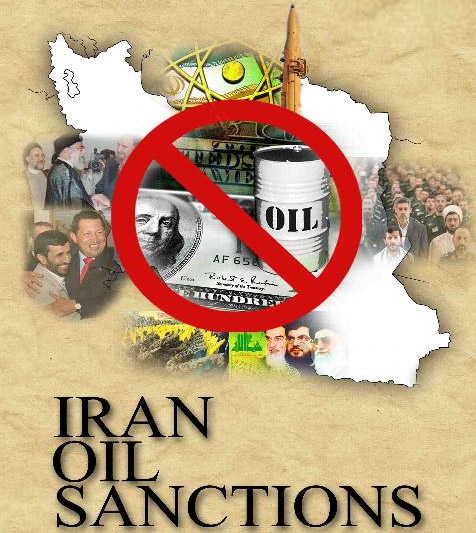Obama approves new sanctions against Iran

By Sara Rajabova
US President Barack Obama has signed an order that imposes new sanctions against Iran that Congress approved this summer, the National Security Council (NSC) said on the White House website, Azerbaijan's Trend news agency reported.
White House National Security Council spokesman Tommy Vietor said in a statement that "this action is part of comprehensive sanctions effort to apply pressure on the Iranian government to meet its international obligations with regard to its nuclear program".
Vietor added that this sanctions effort "has produced profound and demonstrable results".
The sanctions seek to deter Iran from pursuing a nuclear weapons program, as many Western governments suggest it is doing. Iran insists its nuclear development is for peaceful purposes.
US Congress in August passed legislation that would expand sanctions to target individuals or companies who issue or purchase Iranian debt or who assist the Iranian government in the development or transportation of oil or petrochemicals.
Also, the European Commission keeps its sanctions regime, including the sanctions imposed on Iran, under constant review, a source in the office of European Union foreign policy chief Catherine Ashton said on Monday, Trend reported.
Iran's supreme leader Ayatollah Ali Khamenei said that the West is lying about the sanctions and links them to Iran's nuclear program, though the sanctions have been there for a long time -- even when there was absolutely no nuclear activity in Iran, Press TV news channel reported.
Diplomats from EU member states have started preparing a package of sanctions against Iran with a goal of formally adopting them at a meeting of foreign ministers on October 15 in Luxembourg. The measure will be applied to the countries purchasing Iranian gas.
Europe has already imposed sanctions on the import of Iranian oil. In early 2012, the EU jointly with the United States imposed new sanctions on Iran's oil and financial sectors aimed at preventing other countries from buying Iranian oil and conducting transactions with the Central Bank of Iran.
The U.S. sanctions entered into force on June 28, while the EU ban on Iranian oil imports went into effect on July 1.
The sanctions on the import of Iranian oil can impact the countries purchasing Iranian gas.
One of the main importers of Iranian gas is Turkey, which imports 10 billion cubic meters per year. Turkey's agreement on the gas supplies with Iran was signed in 1996 for 25 years on a 'take or pay' principle. That is, if Turkey refuses to import Iranian gas because of the sanctions, the country will have to pay for not purchasing gas until 2021.
Earlier, Turkey dismissed the US sanctions against Iran's oil imports as illegal and said they make no sense for Ankara. Turkey did not rush to recognize the EU sanctions against Iran's oil imports either. Moreover, the country cannot afford to comply with the sanctions because of the 'take or pay' principle.
According to analysts, Turkey's cooperation with Iran in the field of natural gas imports will be limited by the existing contract, but at the same time, the country is unlikely to sign new such contracts with Iran, in a show of solidarity with the EU.
Besides, Turkey may put pressure on Iran, putting forward a condition that it would reject Iranian gas unless Tehran reduces gas prices.
If the sanctions on Iran's gas are imposed, it can also affect Turkmenistan, EU economic advisor Mehrdad Emadi was quoted by Trend news agency as saying.
"This is a very important issue, as Turkmen gas is exported to Europe via Iran," Emadi said. "If the sanctions against Iran are imposed, it means the restrictions would also affect Turkmenistan."
"In the short term, considering the upcoming winter, I believe no sanctions on gas will be imposed," Emadi said.
In 2010 Iran's natural gas production was estimated at 146.2 bcm, and the figure reached 151.8 bcm in 2011. Annually, Iran imports some 10.5 billion cubic meters of gas from Turkmenistan.
"In my opinion, Western countries would think of some short-term framework within which the gas will continue to be transported to Europe through Iran, until an alternative is found," Emadi said.
With regard to European companies still purchasing Iran's gas, the advisor said that major EU companies have cut down their purchases, yet some intermediary companies still deal with the Islamic Republic under short-term deals ranging from 45 to 90 days.
"In this context, if all the small contracts are combined, this would make a relatively significant volume of gas. If the sanctions are imposed, they will be targeting these smaller intermediary companies," Emadi said.
Besides, the International Monetary Fund's (IMF) report, released on Monday, projects that Iran's gross domestic product will decrease 0.9 percent this year but grow 0.8 percent next year. The data also predicts that Iran's inflation rate will fall to 21.8 percent next year from 25.2 percent this year, The New York Times reported.
Iran's Press TV website and semiofficial Fars news agency said the data showed that the country was not only coping with the economic sanctions imposed on its oil and financial operations but was also growing despite those obstacles.
The IMF, whose forecast is based on what some say are questionable figures provided by Tehran, also suggested Iran would tame runaway inflation and get back to growth in 2013.
Iranian authorities have also been battling to prop up the Iranian currency, the rial, which has lost much of its value this year and sparked a recent crackdown on moneychangers.
Here we are to serve you with news right now. It does not cost much, but worth your attention.
Choose to support open, independent, quality journalism and subscribe on a monthly basis.
By subscribing to our online newspaper, you can have full digital access to all news, analysis, and much more.
You can also follow AzerNEWS on Twitter @AzerNewsAz or Facebook @AzerNewsNewspaper
Thank you!
